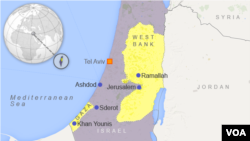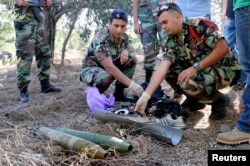Fighting intensified as Israel continued its Gaza offensive for a fourth day Friday, with Palestinian militants continuing rocket attacks on the Jewish state and rocket fire coming from Lebanon for the first time.
Israeli Prime Minister Benjamin Netanyahu said he will not bow to international pressure to stop the military campaign.
Netanyahu said Friday no pressure would prevent Israel from combating "terrorists" that call for Israel's destruction. Other Israeli politicians backed him up.
"If we are able to stop [the rocket barrage] from the air and Hamas understands the price is too big - there will be no need in ground invasion. But if Israel, for its own reasons, seeks an escalation - we’ll have to conduct the ground operation,” said Ze’ev Elkin, chairman of the Knesset Foreign Affairs Committee.
A rocket launched from Lebanon into northern Israel early Friday drew retaliatory artillery fire from Israeli troops, raising fears of a broader regional conflict.
The rocket, launched around 6 a.m. local time, struck an open area near Metula at Israel's northernmost tip without causing casualties or damage, the AFP news agency reported.
"It wasn’t fired by Hezbollah - Israel’s main threat in Lebanon - but by a person who was apprehended by the Lebanese military while the rockets were still [being] launched. From time to time Palestinian organizations in Lebanon make such attempts," Elkin said in an interview with VOA's Russian service.
Israeli troops responded by firing about 25 artillery shells on southern Lebanon, the Associated Press reported.
Israel filed a complaint with the United Nations Interim Force in Lebanon, which monitors the countries' border, AFP reported.
Hamas isues warning
Also Friday, Hamas warned airlines against using Tel Aviv's international airport, which has maintained flights desipite the aerial offensive launched Tuesday by Israel.
“The armed wing of the Hamas movement has decided to respond to the Israeli aggression, and we warn you against carrying out flights to Ben-Gurion airport, which will be one of our targets today because it also hosts a military air base,'' the Islamist group's Izz el-Deen al-Qassam Brigades said in a statement, Reuters reported.
The group, saying it wanted to avoid injuries to passengers, had fired at least one rocket toward the airport Friday.
The airport quieted for about 10 minutes after a siren sounded because of a general alert in the Tel Aviv area, Israel’s Airports Authority spokesman told Reuters.
Intense air attacks
Israeli warplanes have launched more than 1,000 strikes since Tuesday.
The military said it hit targets belonging to the ruling Islamic militant group Hamas, including long-range rocket launchers, government facilities, smuggling tunnels and training camps.
The Israeli military said its air strikes had hit another 320 Hamas targets Thursday, focusing on underground tunnel networks and rocket-launching sites but also hitting homes.
Israel has reported no fatalities, while Palestinian officials say the death toll from Israel's Gaza military offensive has risen above 100, including women and children.
Palestinian President Mahmoud Abbas has accused Israel of "genocide" in the attacks.
Israeli Prime Minister Benjamin Netanyahu said Israel has delivered a severe blow to Hamas and other terrorist groups, and he promised the operation would inflict even more damage. The offensive will unfold in stages, the prime minister said, hinting at a possible ground operation.
Israel has deployed tanks and artillery along the Gaza border and has called up at least 20,000 reservists.
Hamas has been hitting back with rocket salvoes. On Friday, a rocket slammed into a gas station in Israel’s southern port city of Ashdod near Gaza, causing a massive explosion. Three Israelis were injured, one seriously.
Hamas spokesman Fawzi Barhoum vowed that the group would reach every house and military facility in Israel and force three million Israelis into bomb shelters.
Hamas doesn’t seem interested in a political solution, Elkin said.
"Currently they are in total international isolation, they've even lost the support of their traditional ally, Egypt. They don’t have money for the functioning of their regime in Gaza, and maybe this escalation is their attempt to divert attention from their failure," he said.
Diplomacy urged
The ongoing strife prompted U.S. President Barack Obama to phone Israeli Prime Minister Benjamin Netanyahu Thursday to express concern and offer help in negotiating a resolution to the crisis.
"The United States remains prepared to facilitate a cessation of hostilities, including a return to the November 2012 cease-fire agreement," the White House said Obama told Netanyahu, according to Reuters news agency. The president also repeated his condemnation of Hamas rocket attacks on Israel and reaffirmed Israel’s right to defend itself.
The White House says it is willing to turn to some of its Middle East allies to help bring an end to the violence between Israel and the Palestinians.
Spokesman Josh Earnest said Friday the U.S. has a number of relationships it is willing to leverage.
Earnest also condemned rocket attacks on Israel Friday from Lebanon. He reaffirmed Israel's right to defend itself while again appealing to all sides to protect civilian lives and restore calm.
U.S. Defense Secretary Chuck Hagel spoke via telephone Friday with Israeli Minister of Defense, Moshe "Boogie" Ya'alon. Minister Ya'alon updated Secretary Hagel on the events unfolding in Israel and Gaza.
As Israeli warplanes relentlessly attacked hundreds of Hamas targets in Gaza Thursday, Netanyahu told a parliamentary committee that a cease-fire is "not even on the agenda."
Meanwhile, U.S. Secretary of State John Kerry phoned Egypt’s foreign secretary to ask that the country exert its influence in defusing the situation, Reuters reported. Egypt played a critical role in mediating a cease-fire between Israel and Hamas in 2012. The U.S. government refuses to negotiate directly with Hamas, which Washington considers a terrorist organization.
Kerry “has been reaching out to countries in the region, including Qatar, including Egypt," State Department spokeswoman Jen Psaki said, according to Reuters. "… Any country in the region that can play a role in bringing an end to the rocket fire from Hamas, we're certainly going to be engaged with."
United Nations chief Ban Ki-moon called Thursday for an immediate cease-fire in the Israeli conflict with Hamas militants in Gaza, but neither of the warring sides showed any hint of stopping its attacks.
The U.N. secretary-general told an emergency meeting of the Security Council that Israel and Hamas "must exercise maximum restraint" to end the fighting.
Violence in the region has escalated since the killing of three Jewish students last month and the murder of a Palestinian teen in a suspected revenge attack.
VOA's Robert Berger contributed to this story.







